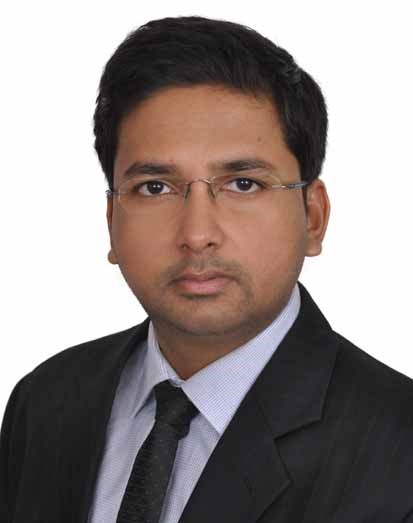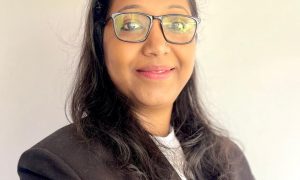This interview has been published by Namrata Singh and The SuperLawyer Team

What inspired you to pursue a career in law, and can you walk us through your journey from being a science graduate to becoming a notable practitioner in intellectual property and technology law? Who or what influenced your decision to transition into the legal field?
I often call myself an “Accidental Lawyer”. I come from a background where my parents were doctor and teacher respectively. Hence, like any kid from a Tier-III city, my ultimate aim was to either clear the entrance examinations for medicals or otherwise complete my graduation in order to become eligible for UPSC examination. But, destiny had some other decisions for me.
When I could not crack any medical entrance examination, my parents enrolled me in B.Sc. Life Sciences at Kirori Mal College so that I can prepare for the medical entrance examination during the first-year college. To achieve this, they got me admitted to a coaching institute as well and for the whole 1st year of my graduation, I was doing both. However, till that time my interest in medical examinations started to dwindle and I gradually gravitated towards the world of science. I would like to highlight here that since beginning, I was not the one who can walk on a conventional path. Hence, during my graduation, a non-conventional course, B.Sc. Life Science and a motivating mentor, Professor Rajni Gupta, helped and guided to get a scholarship from Government of India, under the name of Kishore Vaigyanik Protsahan Yojna. While working on my research, during the third-year of my graduation, I got exposed to the very first concept of “patents” which kind of fascinated me. Everyone in the college was super sure that I will continue to work in the field of science and then came a second change in my academic career.
My father, a retired Government servant, guided me to sit for UPSC, however I was not prepared for that. Then came my all-time mentor, my mother in the picture, who supported me in my madness and supported my decision. With the sole intention to be around UPSC aspirants, I gave the entrance examination for Faculty of Law, University of Delhi and I still don’t know how I cleared it. All said and done, within a month from a research scholar in science, I became an UPSC aspirant in the first year of my LLB. When I started to study law, I felt that this is one of the most organic educations, which not only deals with actual problems but also provides real solutions for real problems. This shift kind of stuck with me and gradually I decided to give it a try with all my energy and dedication. This was the first time I became aware of Intellectual Property Rights and how I can actually weave my science degree with law.
I started to gain more experience by way of internships and gradually landed with Singh and Singh, where I got an opportunity to work with some of the best legal minds in the field of patents. My mentors there guided me as to how my science background can be utilized in the legal profession. Thereafter, I got an opportunity to work with K&S Partners, which not only provided me with a platform to work on allied areas of Intellectual Property Laws but also provided experience of working in multi-jurisdictional courts and with multi-jurisdictional counts. Needless to mention, colleagues at K&S Partners, and primarily Mr. Ravi Bhola, were always supportive of my non-conventional ways of approaching any problem. With this exposure, my interest gradually tilted more towards allied areas of Intellectual Property Laws, which in general parlance, we call it Technology Laws and then I got an opportunity to work with Akamai Technologies, where I am currently working.
In short, I would say circumstances, my mentors and to some extent my non-conventional mindset, are key contributors in my legal journey so far.
As a Senior Counsel at Akamai Technologies, you’re dealing with cutting-edge issues in cloud computing, and intellectual property. What are some of the most exciting aspects of working in this field, and what challenges do you often encounter?
The most exciting part of my job at Akamai is the opportunity which I get to solve real business problems. As Akamai operates in different jurisdictions across the world, it becomes equally important for us to be at least aware of the law of the land which can be applicable on our services. As I primarily look after Technology Law issues, it becomes all the more important for me to understand how law is shaping up in relation to our existing or any prospective product set. Hence, I would sum up the exciting part of my job as under, as opportunities to:
- understand business;
- understand a business problem;
- to learn and apply legal varies areas of law to solve a business problem.
Having said that, it is very difficult for me to docket challenges at my current job, because I see these challenges as an opportunity to grow, which further satiates my non-conventional mindset. However, I do want to call out some operational challenges, like working across multiple time-zone issues, which everyone will face while working for a multi-jurisdictional organization. But, this is something which varies from organization to organization. I am glad that at Akamai, it is never an expectation to remain available across multiple time zones and all the colleagues constantly endeavor to remain available in a time-zone which is less cumbersome for the other.
You handle various transactional documents and engage with law enforcement authorities globally. How do you stay updated with the rapidly evolving legal landscape, especially in the realm of technology and data privacy?
Yes, as a part of my job, it is an unsaid rule, that although I have educational background in Indian laws, it is an add-on, if I have a working knowledge of the legal landscape of other jurisdictions as well. My first source of truth for understanding legal requirements outside India, are my colleagues, who are trained in laws for that jurisdiction. One need to understand here that you cannot gain or remain updated with ever changing legal requirements across the globe without having collaborative working relationships with your peers in those jurisdictions. Hence, before doing desktop research, I always rely on the expertise of my colleagues and one should always follow this. In today’s era, where information is accessible at your fingertips, I have seen individuals giving knowledge on laws of other countries. But, I always follow the differentiation between theoretical and practical knowledge, because it is the practical application of any law which will give you a solution and not the theoretical knowledge.
Having said that, for an individual’s growth and to quench my thirst for knowledge, I always try to read comparative analysis of any law across the globe with Indian laws. This helps me in identifying the differences and those differences are the key to understanding any legal landscape around the world. One can always refer and reply to comparative analysis prepared by good law firms or think tanks, to begin with.
As a registered Indian Patent Agent, what are some common misconceptions or challenges that an applicant/patentee often faces regarding intellectual property rights, and how did you address them while you were litigating?
There were two critical issues which always used to come while I was doing patent litigation. First and foremost, was whether a patentee is inviting revocation proceedings by suing the other party. Second one was, how to assess damages before initiating any litigation, so that a patentee can do cost benefit analysis well in advance.
For the first issue, my response was pretty simple. I always used to advise my client that if you have taken a business decision to apply for a patent, that decision should also include the decision to defend that patent for its lifetime. Because a patent, whether sitting idle or going to be enforced, will remain vulnerable to get challenged during its entire lifetime.
For the second issue, my advice was to at least get a presumptive idea of loss which they are facing, because of the infringing activities and gather clear and cogent evidence to substantiate the same. Reason being, granting damages are within the jurisdictional realm of court and our duty is to give clear and convincing evidence to the court to assist the court in arriving at a particular decision.
Considering your extensive expertise in intellectual property laws, what advice would you offer to the current generation of law students aspiring to build a career in this field?
My advice to the student would be to first focus on developing a strong grasp over concepts of law and the same can be done by not only reading the statutes but also understanding how a statute was applied to solve a real time issue. A law student in his/her journey should do two things: read judgments with the mindset as to how a statute/legal principle was applied to solve the issue at hand and secondly, to gather experience by way of internships. I would like to highlight here that I am aware that getting internships is not an easy cakewalk for all the law students from different law colleges, because I faced the same issue. But in today’s world there are organizations like LawSikho who are actually guiding and helping students. Having said that, I always believed that actual application of law can be best understood in Courts and this is something which I did when I was a law student. I did not wait to hear back from an organization on my internship application, I simply went and knocked the doors of multiple practicing advocates in the Trial Court, and most of them helped me in understanding practical nuisances of law. I am ardent believer of this phrase:
“You will never know what is there on the other side of the door, until and unless you knock and ask. At the best you will get a clarity, which door to knock later and which door should be avoided”
Looking ahead, what are some emerging trends or legal challenges in the field of IP and technology law that you believe will shape the future of legal practice, both in India and globally?
IP and technology law evolves with evolving technology. With the current set of technology in place, based on my set of expertise, I would bet on Artificial Intelligence, which has the potential to be evolved as a separate area of practice in law.
You’ve authored several articles and publications on intellectual property rights and patents. What motivates you to share your insights and knowledge with a broader audience, and how do you approach the process of writing on complex legal topics?
Writing articles is my way of keeping myself abreast with the evolving areas of law. I have been an ardent believer of the logic that when you write, you learn more. And the beauty of writing articles is that you get feedback from either your peers or from someone who has more experience than you.
Before writing on any subject, there are two things which should be kept in mind: whether the topic is relevant in the present set of circumstances and who your audience is. Once you have cracked this, it is your responsibility to state the correct facts and for which I am very stringent to only rely on trusted sources, like the statute itself, or the judgment itself.
You transitioned from your role as a Senior Associate at K&S Partners to an in-house Counsel. Can you share with us what motivated this transition and how it has impacted your approach to legal practice?
My motivation for this transition was to keep myself in pace with the changing legal landscape. While litigating, I was exposed to certain issues which was mostly relevant from the applicability of Indian laws. However, when working with clients from different jurisdictions, I became aware as to how other jurisdictions are looking at similar issues with a different legal angle which I was looking at from Indian legal requirements. This quest to learn more on multi-jurisdictional approaches, helped me to make this switch. Needless to mention here that at this stage of career you cannot take such decisions without the support of your family. Here, I would like to give a shout out to my wife, Meghana, who herself specializes in IP litigation, in supporting my non-conventional decision here.
My decision has definitely impacted my approach to legal practice, because in India, we often see in-house Counsel as an intermediary between client and its outside counsel. However, after joining Akamai, this myth got broken for myself, because the role of an in-house counsel is to understand the business requirement and give a legal solution for that requirement.
Having transitioned from roles in litigation to that of an in-house counsel, what notable differences did you find in the nature of work, challenges faced, and overall professional satisfaction? How did these experiences shape your career trajectory and approach to legal practice?
While I think I have captured the issues around the nature of work and challenges faced in my earlier answers, I can probably focus here more on professional satisfaction. For me, the definition of professional satisfaction keeps on changing because I always understand and foresee a legal career as an organic career, which keeps on changing with the changing issues in society and technology. I joined Akamai with the sole interest to understand the application of intersection of multi-jurisdictional law on the evolving technologies. This still remains relevant for me with the present set of affairs. In a nutshell, I was fortunate to shape my career based upon my experiences and one should always remain open to changes.
Apart from your professional pursuits, do you have any personal hobbies or interests that you find equally fulfilling? How do you balance your passion for law with other aspects of your life?
In my circle, I am known for my passion for driving. While this may not be considered as a hobby or interest, for me somehow it helps in clearing my head. While I am not quoting from the famous series, “the Lincoln Lawyer”, driving is something which has stuck with me from the very early ages of my life and is still continuing. While some people confuse this with the passion for new cars, this is not the case. I enjoy driving with whatever I have, I have and what I aim to have (off course keeping in mind the budgetary constraints ☺).
For me there is no requirement to balance my passion for law with other aspects. Like driving is a passion for which I will not compromise on anything, similarly for learning new legal nuisances, I do not have set boundaries to learn. I believe that you tend to balance and make time for things which you are forced to do. For your passion, you should not be balancing your time with other things in life. While there are priorities in life for which you need to give time, but whenever you have time give priority to your passion, whether for law or for driving or for anything else.
Get in touch with Saurabh Anand–























